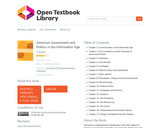7133 Results

- Subject:
- Political Science
- Material Type:
- Unit of Study
- Provider:
- Rice University
- Provider Set:
- OpenStax College


- Subject:
- Social Science
- Material Type:
- Module
- Date Added:
- 09/20/2018

This text is a comprehensive introduction to the vital subject of American government and politics. Governments decide who gets what, when, how (See Harold D. Lasswell, Politics: Who Gets What, When, How, [New York: McGraw-Hill, 1936]); they make policies and pass laws that are binding on all a society’s members; they decide about taxation and spending, benefits and costs, even life and death.Governments possess power—the ability to gain compliance and to get people under their jurisdiction to obey them—and they may exercise their power by using the police and military to enforce their decisions. However, power need not involve the exercise of force or compulsion; people often obey because they think it is in their interest to do so, they have no reason to disobey, or they fear punishment. Above all, people obey their government because it has authority; its power is seen by people as rightfully held, as legitimate. People can grant their government legitimacy because they have been socialized to do so; because there are processes, such as elections, that enable them to choose and change their rulers; and because they believe that their governing institutions operate justly.Politics is the process by which leaders are selected and policy decisions are made and executed. It involves people and groups, both inside and outside of government, engaged in deliberation and debate, disagreement and conflict, cooperation and consensus, and power struggles.In covering American government and politics, this text introduces the intricacies of the Constitution, the complexities of federalism, the meanings of civil liberties, and the conflicts over civil rights;explains how people are socialized to politics, acquire and express opinions, and participate in political life; describes interest groups, political parties, and elections—the intermediaries that link people to government and politics; details the branches of government and how they operate; and shows how policies are made and affect people’s lives.
- Subject:
- Political Science
- Social Science
- Material Type:
- Textbook
- Provider:
- University of Minnesota
- Provider Set:
- University of Minnesota Libraries Publishing
- Author:
- David L. Paletz
- Diana Owen
- Timothy E. Cook
- Date Added:
- 06/06/2011

Table of Contents:
Module 1: New World Encounters
Module 2: New World Experiments
Module 3: Putting Down Roots
Module 4: Experience of Empire
Module 5: The American Revolution
Module 6: The Republican Experiment
Module 7: Democracy & Dissent
Module 8: Republican Ascendancy
Module 9: Nation Building & Nationalism
Module 10: The Age of "Jacksonian Democracy"
Module 11: Southern Society Before the Civil War
Module 12: Northern Society Before the Civil War
Module 13: An Age of Expansionism
Module 14: Sectional Crisis
Module 15: Secession & Civil War
Appendices
- Subject:
- History
- U.S. History
- Material Type:
- Textbook
- Author:
- Lumen Learning
- Date Added:
- 04/12/2021














